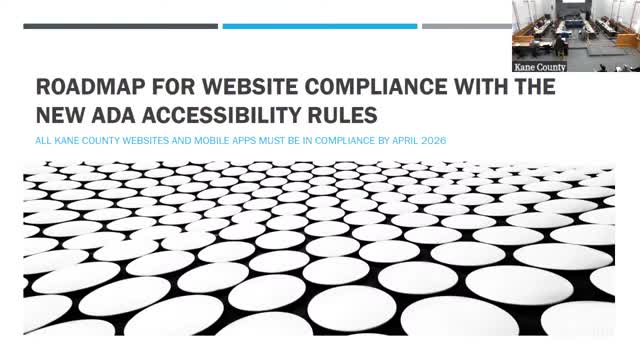Kane County outlines plan to meet new federal web‑accessibility rule ahead of April 2026 deadline
Get AI-powered insights, summaries, and transcripts
Subscribe
Summary
IT staff told the Administration Committee that Kane County must bring websites and mobile apps into WCAG 2.1 AA compliance under the DOJ's Title II rule; departments will need to help convert or archive thousands of PDFs and forms before the 2026 deadline.
Kane County’s information‑technology staff told the Administration Committee on Jan. 15 that federal rules require state and local government websites and mobile apps to meet WCAG 2.1 AA accessibility standards and that the county must substantially complete work before the April 2026 compliance date.
Adam Teder, who works with Information Technologies’ applications team, said the U.S. Department of Justice issued a final rule under Title II of the Americans with Disabilities Act requiring websites and mobile applications for state and local governments to meet the Web Content Accessibility Guidelines (WCAG) 2.1 Level AA standard. "The rule aims to ensure that digital content is accessible to individuals with disabilities, enhancing equitable access to public services," Teder said.
Teder told the committee the county began scanning sites and will use at least two scanning services to get baseline scores; the presentation named Silktide as one paid service used in initial scans. He said the county’s overall website templates scored “good to excellent” but that document assets — primarily PDF files accumulated over many years — presented the largest compliance gap. Teder cited raw counts from an automated scan: roughly 7,500 documents need checking and about 4,300 of those need tagging or remediation (figures provided in the presentation).
Teder recommended scanning all county‑controlled websites with two services, establishing department‑level review of content (what PDFs exist, which to archive, and which to remediate), converting fillable PDFs to web forms (the presentation named Laserfiche as one option), and instituting posting procedures so that new uploads comply with WCAG going forward. He told the committee the county aims to reach compliance about four months ahead of the April 2026 deadline.
Teder also reviewed enforcement risk: civil enforcement is possible under Title II. The presentation cited penalty figures used by the state’s attorney’s office — up to $75,000 for an initial ADA violation and up to $150,000 for a subsequent violation — if DOJ or a private litigant brings an enforcement action.
Charles Lasky of the IT department confirmed the work will require participation from other county offices. “Most of the PDFs and data that’s being uploaded is happening within various offices and departments. So this is gonna be a big joint effort to work with all those to get this done,” Lasky said. He said IT will provide scans and tools, but department staff will need to review and remediate their own content and that additional support may be requested.
The committee asked for follow‑up briefings. IT staff said they will continue to update the board and departments as they refine scanning, remediation plans and timelines.
